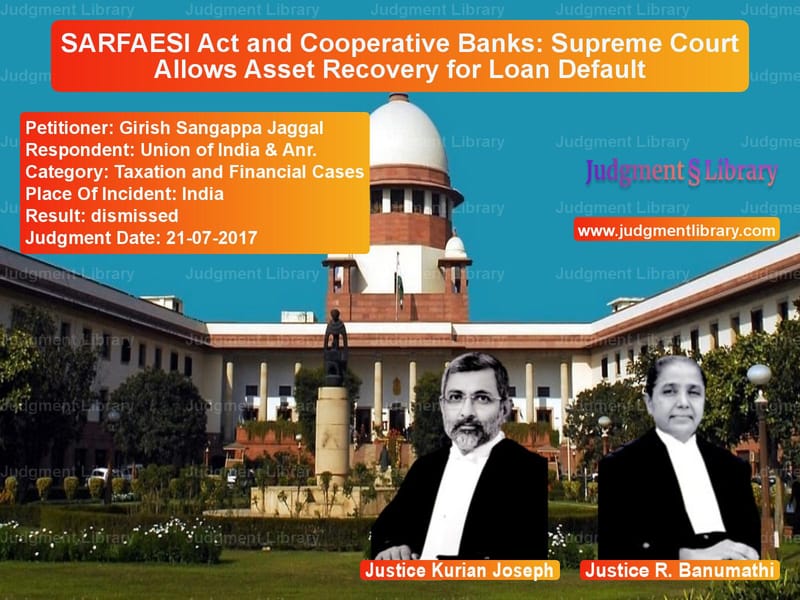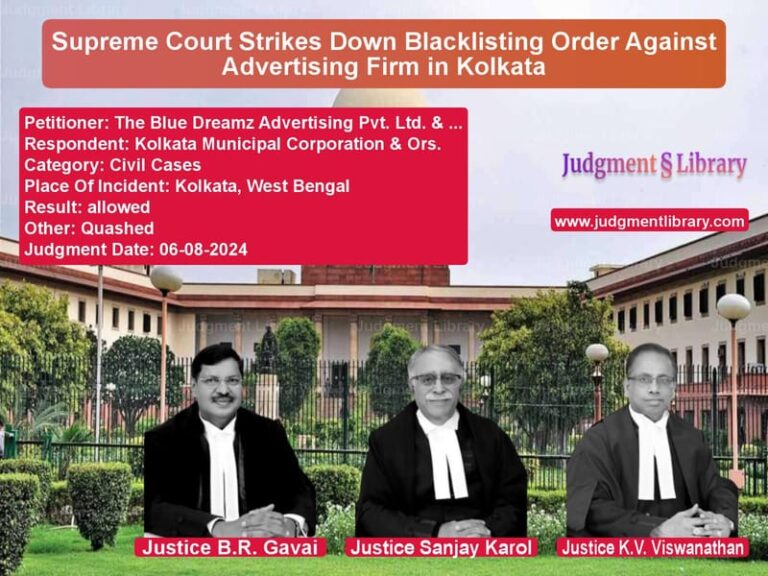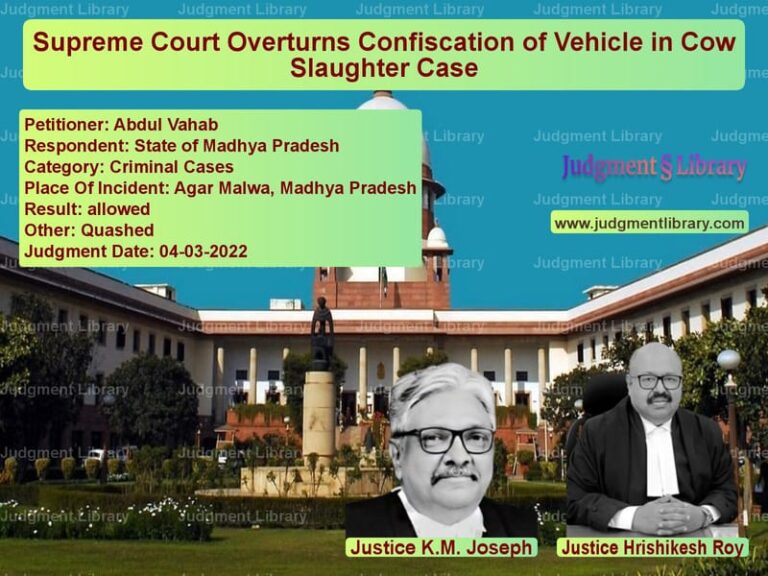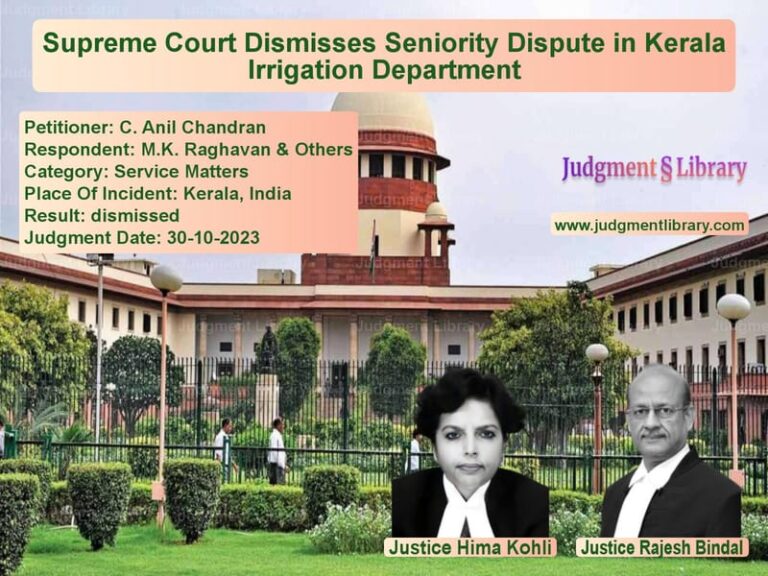SARFAESI Act and Cooperative Banks: Supreme Court Allows Asset Recovery for Loan Default
The Supreme Court’s judgment in Girish Sangappa Jaggal vs. Union of India & Anr., delivered on July 21, 2017, addressed an important legal issue regarding the applicability of the Securitisation and Reconstruction of Financial Assets and Enforcement of Security Interest (SARFAESI) Act, 2002 to cooperative banks. The ruling reinforced the rights of banks to recover loans through asset sales and clarified the balance between borrower protection and lender rights.
The case involved a petition filed by Girish Sangappa Jaggal challenging the recovery proceedings initiated by Respondent No.2, a Cooperative Bank. The petitioner argued that cooperative banks should not be covered under the SARFAESI Act and sought relief from loan recovery actions. However, the Supreme Court ruled in favor of the bank, directing that the recovery process should proceed equitably while ensuring fair treatment for the debtor.
Background of the Case
The petitioner had taken a loan from the respondent cooperative bank but failed to repay the dues. As a result, the bank initiated proceedings under the SARFAESI Act to recover the outstanding amount by auctioning the mortgaged properties.
Key events in the case:
- Loan Default: The petitioner failed to repay the loan, leading to enforcement actions by the bank.
- Legal Challenge: The petitioner filed a writ petition challenging the jurisdiction of the SARFAESI Act over cooperative banks.
- Property Auction: One of the properties listed in Schedule “B” (Annexure P-2) was already sold before the court’s intervention.
- Supreme Court Inquiry: The Court asked whether the petitioner could make any deposit to settle the dues, but he reported having no financial resources.
- Judgment Date: The Court issued its ruling on July 21, 2017, allowing the bank to proceed with asset recovery.
Arguments by the Petitioner (Girish Sangappa Jaggal)
The petitioner presented the following arguments:
- The SARFAESI Act should not be applicable to cooperative banks.
- The bank’s recovery actions were unfair and needed judicial intervention.
- The remaining loan liability could be cleared if the first two properties were sold.
- Due to pending litigation, the properties were not attracting buyers in the public auction.
Arguments by the Respondent (Cooperative Bank)
The cooperative bank countered the petition with the following arguments:
- The petitioner had defaulted on the loan, necessitating recovery proceedings.
- The SARFAESI Act provides banks with the legal right to recover dues through asset sales.
- The pending litigation was discouraging potential buyers from bidding on the properties.
- The bank needed a clear legal pathway to enforce its security interest efficiently.
Supreme Court’s Observations
The Supreme Court, comprising Justices Kurian Joseph and R. Banumathi, made the following key observations:
“Because of the pending litigation, nobody is prepared to take a risk for purchasing the property even in a public auction.”
“It is in the interest of both the sides to put an end to this litigation by extending an equitable treatment to the petitioner debtor.”
“The petitioner shall not take recourse to any other litigation regarding the procedure for sale without permission from this Court.”
Supreme Court’s Judgment
The Supreme Court ruled:
- The bank should first attempt to recover the dues by selling the first two properties listed in Schedule “B” (Annexure P-2).
- If the liabilities were still not cleared, the bank could proceed with the sale of the fourth property.
- Before selling the fourth property, the petitioner must be given a final opportunity to clear the remaining balance.
- The petitioner was barred from filing additional litigation challenging the recovery process without the Supreme Court’s permission.
Key Takeaways
- SARFAESI Act Applies to Cooperative Banks: The ruling reinforces that cooperative banks can enforce security interests under the SARFAESI Act.
- Equitable Treatment in Asset Recovery: Courts ensure fairness by allowing debtors time to settle liabilities before full enforcement.
- Legal Finality for Auctions: The judgment prevents unnecessary litigation from delaying recovery proceedings.
- Borrowers’ Rights vs. Lenders’ Rights: The case highlights the balance between protecting borrower rights and enabling lenders to recover debts.
Impact of the Judgment
The ruling significantly impacts banking and financial litigation by ensuring:
- Cooperative banks can effectively use the SARFAESI Act to recover loans.
- Debt recovery proceedings are not unduly delayed by repeated legal challenges.
- Public auction sales of mortgaged properties are conducted without fear of litigation.
- Borrowers receive a final opportunity to settle debts before losing their properties.
Conclusion
The Supreme Court’s decision in Girish Sangappa Jaggal vs. Union of India & Anr. reaffirms the applicability of the SARFAESI Act to cooperative banks and ensures a fair balance between borrower protection and lender rights. By allowing the recovery process to proceed in a structured manner, the ruling strengthens the financial sector’s ability to manage loan defaults efficiently while upholding judicial fairness.
Don’t miss out on the full details! Download the complete judgment in PDF format below and gain valuable insights instantly!
Download Judgment: Girish Sangappa Jagg vs Union of India & Anr Supreme Court of India Judgment Dated 21-07-2017.pdf
Direct Downlaod Judgment: Direct downlaod this Judgment
See all petitions in Banking Regulations
See all petitions in Debt Recovery
See all petitions in Tax Refund Disputes
See all petitions in Judgment by Kurian Joseph
See all petitions in Judgment by R. Banumathi
See all petitions in dismissed
See all petitions in supreme court of India judgments July 2017
See all petitions in 2017 judgments
See all posts in Taxation and Financial Cases Category
See all allowed petitions in Taxation and Financial Cases Category
See all Dismissed petitions in Taxation and Financial Cases Category
See all partially allowed petitions in Taxation and Financial Cases Category







